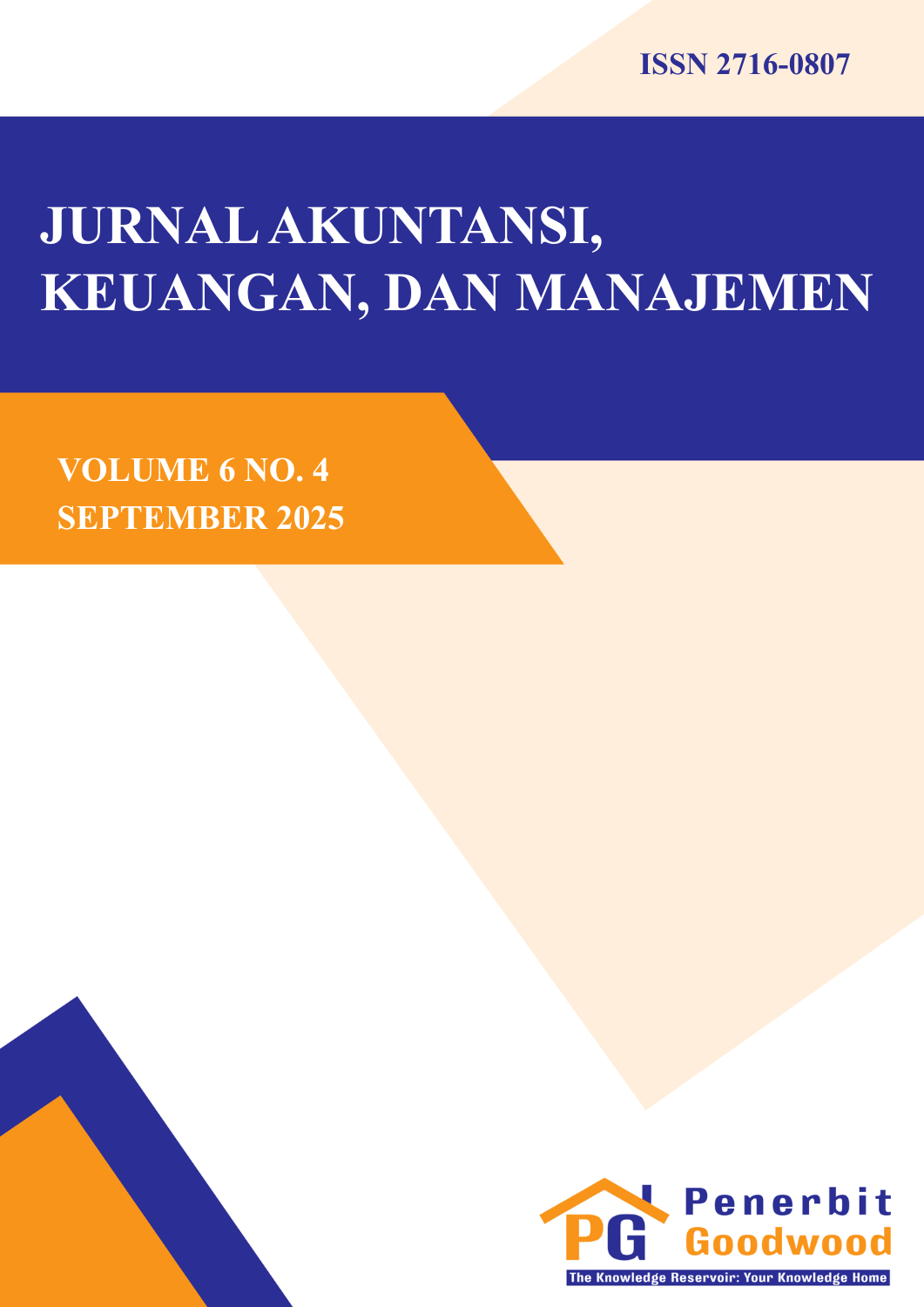Article Details
Vol. 6 No. 4 (2025): September
Evaluating GOTO Investment Strategies After Major Investor Exit: DiD Approach
Purpose: This study tests whether strategic divestment by prominent investors affects the valuation of firms that keep stakes in a high-growth, volatile company, PT?GoTo Gojek Tokopedia?Tbk?(GOTO).
Methodology/approach: A difference-in-differences design compares market performance before and after SoftBank and Alibaba’s exits. Firms retaining GOTO PT?Telkom Indonesia?Tbk?(TLKM) and PT?Astra International?Tbk?(ASII) form the treatment group, while matched non-holders serve as controls. Graphical and statistical checks confirmed parallel trends, validating the model.
Results/findings: Continued GOTO ownership after divestment reduces Tobin’s?Q by 0.291 (p?=?0.093). The Average Treatment Effect on the Treated shows a significant 20.459 point drop in firm value post-event (p?<?0.001). Thus, markets penalized exposure to GOTO, consistent with the signaling hypothesis that major investor exits convey adverse information.
Conclusion: Retaining equity in a volatile firm after high-profile departures poses valuation and reputational risks. Negative market reactions suggest skepticism about GOTO’s prospects and heightened the perceived risk for remaining shareholders. Therefore, the timing and extent of post-divestment exposure warrant careful strategic consideration.
Limitations: The treatment sample is small (two firms), macro sectoral factors are excluded, and data end in Q2?2024, limiting long term inference.
Contribution: By linking ownership signals to firm value in an emerging market context, this study enriches the literature on divestment, signaling, and corporate strategy, demonstrating tangible market costs for stakeholders who remain invested after influential exits.
- Alarussi, A. S. A. (2021). Financial ratios and efficiency in Malaysian listed companies. Asian Journalof Economics and Banking, 5(2), 116-135. https://www.emerald.com/insight/content/doi/10.1108/ajeb-06-2020-0014/full/html
- Aminah, S., & Saksono, H. (2021). Digital transformation of the government: A case study in Indonesia. Jurnal Komunikasi: Malaysian Journal of Communication, 37(2), 272-288. https://core.ac.uk/download/pdf/489539284.pdf
- Bertrand, M., Duflo, E., & Mullainathan, S. (2004). How much should we trust differences-in-differences estimates? Quarterly Journal of Economics, 119(1), 249–275. https://doi.org/10.1162/003355304772839588
- Chung, K. H., & Pruitt, S. W. (1994). A Simple Approximation of Tobin’s q. Financial Management, 23(3), 70–74. https://doi.org/10.2307/3665623
- Dai, W., Wang, Y., Liao, M., Shao, M., Jiang, Y., & Zhang, M. (2023). Performance implications of corporate venture capital investments for entrepreneurial ventures: The differing moderating effects of R&D intensity before and after IPO. Journal of Entrepreneurship in Emerging Economies, 15(5), 1139–1162. https://doi.org/10.1108/JEEE-05-2021-0195
- El?Idrissi,?I., & Alami,?Y. (2021). The financial impacts of board mechanisms on performance: The case of listed Moroccan banks. International Journal of Financial, Accounting, and Management,?3(2),?93 113. https://doi.org/10.35912/ijfam.v3i2.536
- Fahmi, F. Z., & Mendrofa, M. J. S. (2023). Rural transformation and the development of information and communication technologies: Evidence from Indonesia. Technology in Society, 75, 102349. https://www.sciencedirect.com/science/article/abs/pii/S0160791X23001549
- Felton, C., & Stewart, B. M. (2022). Handle with care: a sociologist’s guide to causal inference with instrumental variables. Sociological Methods & Research, 00491241241235900. https://collaborate.princeton.edu/en/publications/handle-with-care-a-sociologists-guide-to-causal-inference-with-in
- Gomila, R. (2021). Logistic or linear? Estimating causal effects of experimental treatments on binary outcomes using regression analysis. Journal of Experimental Psychology: General, 150(4), 700. https://pubmed.ncbi.nlm.nih.gov/32969684/
- Hossain,?S.?M.?K., Sultan,?M.?I., & Ahmed,?M.?M. (2021). Ownership structure and firm performance: Evidence manufacturing companies listed in Dhaka Stock Exchange. International Journal of Financial, Accounting, and Management,?3(3),?227 243. https://doi.org/10.35912/ijfam.v3i3.621
- Hu, W., Sun, S., Penn, J., & Qing, P. (2022). Dummy and effects coding variables in discrete choice analysis. American Journal of Agricultural Economics, 104(5), 1770-1788.
- Ma, S. (2020). The life cycle of corporate venture capital. The Review of Financial Studies, 33(1), 358–394. Oxford University Press on behalf of The Society for Financial Studies. https://doi.org/10.1093/rfs/hhz042
- Oranefo,?P.?C., & Egbunike,?C.?F. (2022). Debt financing and firm valuation of quoted non financial firms in Nigeria Stock Exchange. International Journal of Financial, Accounting, and Management,?4(2),?199 218. https://doi.org/10.35912/ijfam.v4i2.1064
- Oranefo,?P.?C., & Egbunike,?C.?F. (2023). Accounts payable turnover and firm performance of quoted manufacturing firms in Nigeria. International Journal of Accounting and Management Information Systems,?1(1),?45 65. https://doi.org/10.35912/ijamis.v1i1.1247
- Owen, S., & Yawson, A. (2020). The relationship between revenue growth and divestitures: Evidence from multinational companies. Journal of Corporate Finance, 62, 101349. https://doi.org/10.1016/j.jcorpfin.2020.101349
- Rashid, C. A. (2021). The efficiency of financial ratios analysis to evaluate company’s profitability. Journal of Global Economics and Business, 2(4), 119-132. https://ijsses.tiu.edu.iq/index.php/ijsses/article/view/390
- Rekkas, A., Paulus, J. K., Raman, G., Wong, J. B., Steyerberg, E. W., Rijnbeek, P. R., ... & van Klaveren, D. (2020). Predictive approaches to heterogeneous treatment effects: a scoping review. BMC Medical Research Methodology, 20, 1-12. https://pubmed.ncbi.nlm.nih.gov/33096986/
- Tang, S., Chen, Z., Chen, J., Quan, L., & Guan, K. (2023). Does FinTech promote corporate competitiveness? Evidence from China. Finance Research Letters, 58, 104660. https://doi.org/10.1016/j.frl.2023.104660
- Vidal, E. (2021). Divestitures, value creation, and corporate scope. Strategic Management Review, 2(2), 413-435. https://www.nowpublishers.com/article/Details/SMR-0034
- Wagola, R., Nurmandi, A., Misran, & Subekti, D. (2023, July). Government Digital Transformation in Indonesia. In International Conference on Human-Computer Interaction (pp. 286-296). Cham: Springer Nature Switzerland. https://link.springer.com/chapter/10.1007/978-3-031-36001-5_37
- Wan, L., Li, R., & Chen, Y. (2022). Negative performance feedback and corporate venture capital: The moderating effect of CEO overconfidence. Applied Economics, 54(16), 1829–1843. https://doi.org/10.1080/00036846.2021.1982133
- Wu, L., Shao, Z., Yang, C., Ding, T., & Zhang, W. (2020). The impact of CSR and financial distress on financial performance evidence from Chinese listed companies of the manufacturing industry. Sustainability, 12(17), 6799. https://www.mdpi.com/2071-1050/12/17/6799
- Wu, Y., Strange, R., & Shirodkar, V. (2021). MNE divestments of foreign affiliates: Does the strategic role of the affiliate have an impact? Journal of Business Research, 128, 266–278. https://doi.org/10.1016/j.jbusres.2021.02.017
- Yeye,?O., & Egbunike,?C.?F. (2023). Environmental, Social and Governance (ESG) disclosure and firm value of manufacturing firms: The moderating role of profitability. International Journal of Financial, Accounting, and Management,?5(3),?311 322. https://doi.org/10.35912/ijfam.v5i3.1466
- Zhang, T. (2023). Peer effects in R&D investment based on interlock network: Evidence from China. International Review of Financial Analysis, 89, 102752. https://doi.org/10.1016/j.irfa.2023.102752

This work is licensed under a Creative Commons Attribution-ShareAlike 4.0 International License.

